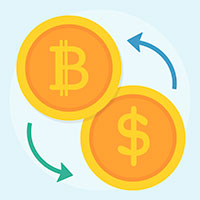As the Cryptocurrency ecosystem continues to expand, traders and investors are increasingly exploring new avenues for interacting with digital assets. DeFi (Decentralized Finance) derivatives have emerged as a significant instrument in this evolving landscape, gaining popularity and demand in financial markets. Despite their growing influence, a comprehensive understanding of DeFi derivatives remains elusive for many. Let's break down this concept to better understand DeFi derivatives, their mechanics, and their impact on the Crypto markets.
Understanding DeFi's Role
At the core of DeFi derivatives is Decentralized Finance (DeFi) itself, a revolutionary model using blockchain technology to bypass intermediaries and centralized institutions in financial transactions. This model empowers two parties to directly execute transactions, trade, or exchange within a secure, encrypted ecosystem, circumventing additional costs typically associated with traditional institutions.
Derivatives in Traditional Finance
Long before DeFi's emergence, derivatives have been a staple in traditional markets, primarily used to hedge price risks and potential losses in business operations. Derivatives are financial contracts whose value depends on an underlying asset or a group of assets. Traditionally, executing these contracts and trading them in secondary markets or over-the-counter (OTC) required intermediaries.
The Essence of DeFi Derivatives
Similar to traditional derivatives, DeFi derivatives are used for hedging price risks and gaining exposure to assets without owning them directly. The key difference lies in their foundation on smart contracts on the blockchain. These contracts automate transactions transparently and eliminate the need for mediators, with the protocol serving as the only intermediary.
DeFi derivatives can be tied to various asset values, including commodities, fiat currencies, stocks, and other traditional assets, despite primarily tracking cryptocurrency markets.
Types of DeFi Derivatives and Their Mechanics
- Futures Contracts: These are common in DeFi, involving an agreement to buy or sell an asset at a future date.
- Perpetual Futures Contracts: These monitor underlying asset prices and manage funding fees according to market conditions. They balance the market by having buyers and sellers fund each other.
- Options: Investors can buy (call options) or sell (put options) digital assets at a predetermined price on a specific expiration date.
- Perpetual Options: Similar to perpetual futures but without a predetermined exercise date, giving investors flexibility to trade underlying assets.
- Synthetic Assets: These represent tokenized versions of various financial products, offering 24/7 trading in transparent blockchain ecosystems.
How DeFi Derivatives Operate
DeFi derivatives typically use automated market makers (AMMs) to facilitate market operations. Unlike centralized exchanges, AMMs don't rely on order books to match buyers and sellers but face unique challenges. Technical solutions like virtual liquidity machines help overcome these, supporting continuous trading by transferring risk to the protocol.
- Smart Contracts: The Backbone of DeFi Derivatives. Smart contracts are crucial in DeFi derivatives, automating trading, clearing, and settlement processes while ensuring security and transparency. They can execute various tasks automatically when specific criteria are met, such as exercising options at a predetermined asset value.
- Oracles: Ensuring Accurate Data for Smart Contracts. Oracles are vital for DeFi derivatives, feeding external data to smart contracts for accurate event probability assessments. They provide essential information on underlying asset prices for smooth derivative settlements.
Risks and Advantages of DeFi Derivatives
Like any financial product, DeFi derivatives come with opportunities and risks. Counterparty risk is common, where a party may fail to fulfill the contract, leading to losses. Regulatory uncertainty also adds pressure on the growth of this niche. However, the securitization of contracts and reduced costs make DeFi derivatives attractive for mass adoption.
The DeFi derivatives market offers diverse opportunities for both novice and seasoned investors. Popular platforms for accessing DeFi derivatives trading include GMX, dYdX, and Keep3r, each providing unique features and tools for trading.
Conclusion: Embracing DeFi Derivatives with Caution
DeFi derivatives offer access to real-world assets in a secure, fast, and cost-effective blockchain ecosystem. However, the current regulatory uncertainties and complex market conditions necessitate thorough research and analysis before diving into this domain. For investors looking to leverage these financial tools, understanding the market and its opportunities is crucial for successful engagement.
 In today’s fast-paced financial world, responsible trading is no longer a choice; it's a necessity. Technology has opened the markets to everyone, making access incredibly easy.
In today’s fast-paced financial world, responsible trading is no longer a choice; it's a necessity. Technology has opened the markets to everyone, making access incredibly easy. For active traders and investors, mastering the art of trading volatility is a crucial skill. Volatility, in financial terms, refers to the extent to which asset prices fluctuate over time. High volatility markets experience rapid price swings...
For active traders and investors, mastering the art of trading volatility is a crucial skill. Volatility, in financial terms, refers to the extent to which asset prices fluctuate over time. High volatility markets experience rapid price swings... The global financial market operates as a dynamic ecosystem, where understanding the connections between different market movements can provide invaluable insights for forecasting...
The global financial market operates as a dynamic ecosystem, where understanding the connections between different market movements can provide invaluable insights for forecasting... The forex market, also known as the foreign exchange market, stands as the largest and most traded financial market globally. FXTM is committed to equipping our clients...
The forex market, also known as the foreign exchange market, stands as the largest and most traded financial market globally. FXTM is committed to equipping our clients... Cryptocurrency trading has rapidly grown into a bustling and dynamic market that attracts traders from around the world. With the potential for significant profits...
Cryptocurrency trading has rapidly grown into a bustling and dynamic market that attracts traders from around the world. With the potential for significant profits...